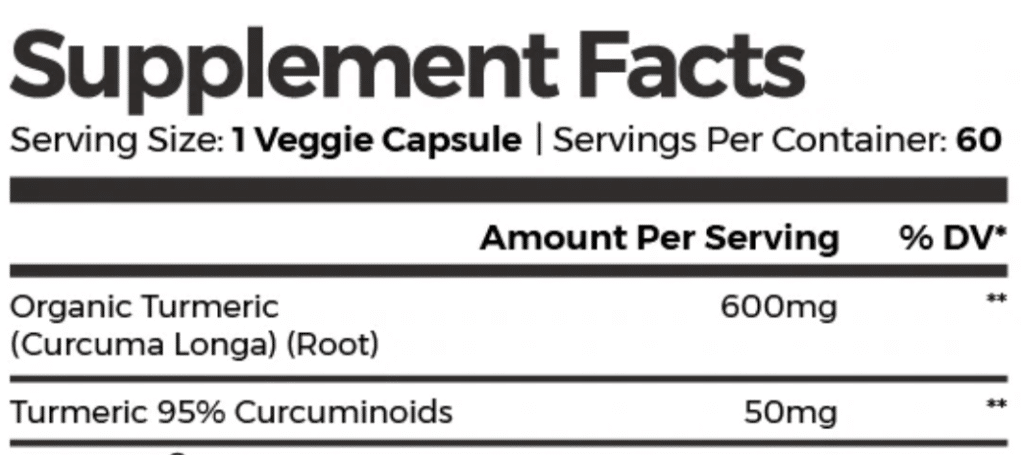Table of Contents
If you're wondering what the difference between turmeric and curcumin is, you're not alone.
I think it's fair to say that navigating the terminology used to describe turmeric and its various preparations is a mind field.
That's why in this article our aim is to clear things up.
We'll go through what really is the difference between turmeric and curcumin as well as clear up all the nuances around this topic.
Are turmeric and curcumin the same thing?
Right, let's get things straight.
When talking about Turmeric, most of us think of the "herb" or "spice" which is the beautifully colored golden-orange powder.
This powder comes from Turmeric Rhizome - which is a fancy name for turmeric root.

In fact, this all comes from a flowering plant called Curcuma longa - see image below

So where does "curcumin" come into this?
Well, curcumin is the name of one of the organic compounds in "turmeric" that is thought to possess its health benefits.
In fact, curcumin is one of many "curcuminoids". i.e one of many of the biologically active compounds in turmeric.
But depending on what studies you look at, "curcuminoids" only make up between 2-6% of turmeric powder. In other words, turmeric as a whole contains lots of other things. But it's the curcuminoids that have been shown in studies to have certain potential health benefits.(1)
So when answering the question, is turmeric and curcumin the same thing? In a way, the answer is not really. Because turmeric contains curcumin, but it's not the only thing to contain curcumin.
There are lots of plants in the "Curcuma" plant species that also contain curcumin, albeit to a much lesser extent.
Therefore, it's like asking: Is vitamin C the same as orange juice?
We all know that orange juice is a source of vitamin C, but it's also found in lots of other fruits and orange juice is made up of lots of other components.
Make sense?
In summary: Turmeric contains high amounts of curcumin, which is a biologically active compound. So if you're interested in supplements to reap the benefits of turmeric, it's curcumin that is important to look out for.
What actually is curcumin?
We've mentioned that curcumin is a biologically active compound. But what does this actually mean?
Curcumin is a polyphenol. This is the name of a large group of organic compounds which are abundant in plants and herbs.
Polyphenols are biologically active in the sense that they interact with bodily functions. They can exert a change in cellular pathways. Some common pathways include inflammation and antioxidation, for example.
In other words, these naturally occurring organic compounds have the potential to have downstream positive benefits of lots of different health conditions.
And that's why it's always encouraged to eat a diet rich in foods and vegetables - amongst other nutrients, they are packed with polyphenols.
In summary: Curcumin is a polyphenol that has been shown in studies to have potential health benefits.
Is it better to take turmeric or curcumin?
If you've landed on this article, chances are you're looking into turmeric supplements and are getting confused between turmeric and curcumin supplements. That's because brands use a mixture of these names which doesn't make it easy.
Ultimately, it's the curcumin part of turmeric that possesses health benefits.
That means you should be looking for the curcuminoid/curcumin content in supplements.
Regardless of what it says on the front of the packaging, the best place to start is the ingredients table on the back. Take a look at the table below for example:

You'll notice that this supplement contains two different turmeric preparations.
The first one is organic turmeric root which is, in essence, the same as turmeric powder used in cooking. We won't know the exact curcumin content in this portion. But as previously mentioned, standard turmeric powder only contains on average of 3-4% curcumin.
The second one is turmeric that's been standardized to 95% curcuminoids. This means that 47.5mg of the 50mg will be curcumin.
Seeing as it's the curcumin content we are looking for, choosing a supplement with a standardized curcumin content.
The other thing to be aware of is that curcumin is very poorly absorbed and only a fraction is absorbed into our bloodstream. But there are ways to increase this which we've covered in detail in our article on the bioavailability of curcumin.
In summary: when looking for a turmeric or curcumin supplement, regardless of what it says on the front of the packaging, always look at the ingredients table to see how much curcumin the extract contains. Look for standardized supplements with a high percentage of curcumin.
Optimum turmeric or curcumin dosage
There are lots of things to consider when answering this question. But it's important to emphasize that there is no "right" dose.
Ultimately, it depends on personal preference and own experience. And because it's not a drug or recognized medicinal ingredient, there is no official recommended dose.
With that said, people often base the recommended dose of turmeric on previous research studies. And doses between 500mg to 2000mg (of a 95% standardized extract) is generally regarded as safe over a period of months.(2)
One study even showed that a dose up to 12,000mg as a single dose was well tolerated. Although it was just a single dose and not a daily long-term dose.(3)
With all that said, long-term studies are limited.
Turmeric vs curcumin - final words
That brings us to the end of our look into the difference between turmeric and curcumin. Turmeric and curcumin aren't really the same thing as many other articles suggest.
Turmeric contains the biologically active compound called curcumin. Curcumin is not exclusively found in turmeric and is found in smaller amounts in other curcuma family of plants.
When it comes to turmeric supplements, many manufacturers just use curcumin or curcuminoid doses to market their products. And that's because curcumin is the good stuff that harbors potential health benefits.
By knowing this, you can take a look at the ingredients table the next time you're looking for a turmeric supplement to see if the preparation is standardized to contain a high amount of curcumin.
On that note, you can check out our article on the best turmeric supplements to find out which products are the most absorbable.



